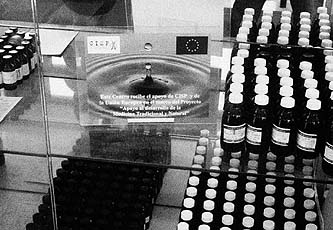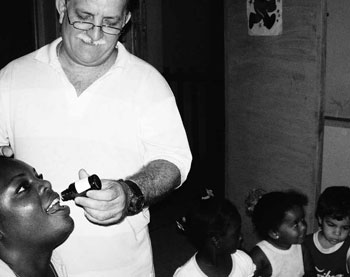Integrating the practice of traditional and natural medicine into the health system
Introduction
As part of the "Health for All by the Year 2000" effort, the World Health Organization issued the Declaration of Alma Ata at the end of the International Conference on Primary Health Care in 1978, which, amongst other proposals, called on the international community to integrate scientifically proven alternative medicines and traditional therapies into their national health systems. At present WHO continues to follow the development of Natural and Traditional Medicine elaborating a working strategy at the global level. As far as Cuba is concerned, a number of clinics were already using various forms of traditional medicine, but it wasn't until 1996 that a programme of strategic objectives and measures was passed to develop these techniques and methods. Now, 12 years later, the techniques of traditional and natural medicine, or TRM (known as MTN in Cuba), have been definitively incorporated into the national health system of Cuba.
TRM is a broad-spectrum specialization, which includes health promotion, prevention of disease, diagnosis, treatment and rehabilitation of patients utilising, amongst other things, traditional Chinese medicine (acupuncture, acupressure, moxibustion, cupping, therapeutic massage), herbal medicine, apitherapy, homeopathy, flower therapy, suggestion and hypnosis. It also includes treatments employing natural resources such as spa waters, mineral mud therapy, ozone, magnetic fields and other sources of natural energy.
In recent years, perhaps the most significant achievement of this programme in Cuba is to have gradually and stably integrated TRM resources into the National Health Service, offering broad coverage both in primary and secondary health care. Specialised TRM development centres are present in all the country's provinces and integrated rehabilitation services with NTM departments were created in the country's municipalities. This has had a positive effect on the efficiency and quality of health services, which are now better integrated into the community in the prevention of non-transmissible chronic illnesses and epidemics. It also offers a less harmful and more efficient solution to health care problems from the economic point of view, providing savings in expenditure on industrially produced chemical medicine and fewer adverse reactions were reported.
Cuba's accumulated experience in the field of traditional medicine has been recognised by specialist organisations and experts in China, Vietnam, Korea, Mexico, Colombia, USA, Guatemala, Venezuela, Spain, Italy, and other countries that have appreciated the positive results gained and have come to view these efforts as a cutting edge experience. The international community has given this programme further impulse by providing donations, literature, expert help, and joint research and international collaboration projects.
The employment of TRM is of strategic importance in the field of human development, since it can be applied in areas with no or insufficient health services. It fulfils a crucial role in emergency situations, such as natural or manmade catastrophes, since all that is required is trained personnel and the resources of the surrounding environment. As part of the national health system, it improves the capacity of the medical services to resolve problems and is a source of new jobs.
The benefits that TRM brings are most noticeable in areas where there is no or insufficient health infrastructure, and represents a way of extending social protection to the poorest sectors of the population. It is also one of the most effective ways of improving, at reduced cost, medical assistance to millions of people in the most disadvantaged areas, who find themselves at the margins of national social security programmes.
DOWNLOAD THE BROCHURE PDF
english (1.1 MB)spanish (1.1 MB)
serbian (0.5 MB)
ONLY TEXT
•Traditional and Natural Medicine in practice
•The employment of Traditional and natural medicine in other countries








 COUNTRY OF ORIGIN
COUNTRY OF ORIGIN